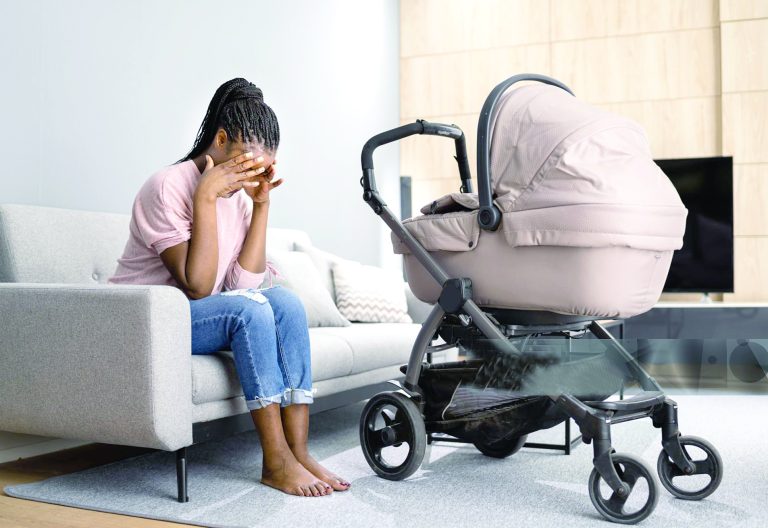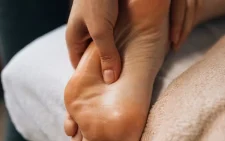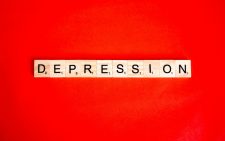‘I hate my baby’, silent pain in young mothers

“I don’t know why, but I hate my newborn baby. They make me sick,” that confession from a new mother is telling. And it is a common silent pain, especially among first-time young mothers.
Although motherhood is often painted as a time of boundless happiness, the truth is that many young women struggle with psychological and physiological changes that can lead to deep emotional distress. Enter Postpartum Depression (PPD).
Modern Family spoke to one young mother who shared her experience with PPD.
For Evelyn Njeri, motherhood was a journey filled with unexpected challenges, severe physical changes, and a test of emotional resilience.
While pregnancy is commonly associated with weight gain, a radiant glow, and the anticipation of new life, Evelyn’s experience was different.
“When I found out I was pregnant, I expected changes, but I never thought they would be so extreme. My pregnancy made me glow, but at the same time, I lost a lot of weight. I transitioned from being what people considered fat to being incredibly thin. In my first trimester alone, I lost over 15 kgs,” Njeri recalls.
For Evelyn, the biggest challenge wasn’t just the physical transformation, it was stepping into the unfamiliar role of a mother for the first time.
The sleepless nights
“I had never taken care of an infant before. Growing up, my younger sibling was already big, so I never had to handle a baby. Suddenly, I had this little person completely dependent on me, and I had no teacher to guide me. It was a scary experience,” she says.
Being far from home made the experience even more daunting. Without the immediate support of family, she had to navigate the early days of motherhood on her own. The emotional and psychological toll of postpartum changes added to her struggle.
“I was used to waking up early, going to work, and being independent. Now, I was at home with my son, relying on someone else for support. That feeling of stagnation, of not progressing, was tough,” Njeri says.
Despite the hardships, Evelyn always knew that having a child was something she wanted.
“This experience gave me a deep sense of satisfaction. It was something I had been eager for, and despite the struggles, I knew it was a blessing,” she says.
Despite a lot of struggles, she found strength in seeing other women who had gone through similar experiences and come out stronger.
“I saw young mothers and older women who had children and had accepted themselves. That gave me hope,” she says.
With time, she learned the importance of self-love and acceptance. “Motherhood is a phase, a transition every woman must go through, and it comes with challenges. People will have opinions, but you have to love yourself. If you don’t, it becomes even harder.”
Coming to acceptance
She learned that everything changes when you become a mother. Most of the changes aren’t positive, and sometimes you will look at your body and wonder where certain things came from.
But if you focus on the negatives, you’ll struggle. What helped her was accepting herself and knowing that this stage wouldn’t last forever.
One of the hardest parts of Evelyn’s journey was dealing with postpartum depression, something she didn’t fully understand until much later.
“I was in denial. I did not plan for the pregnancy, and it took me a long time to accept it. I didn’t go to therapy, and I didn’t even realise I was going through so much until it was over,” she says.
As her child grew, the weight of the experience slowly lifted. She says with time, you start to forget the struggles since the love you develop for your child overshadows everything else.
According to Rachael Jael Irusa a gynaecologist, PPD is a depressive mood disorder that begins during pregnancy or within four weeks after childbirth and persists for at least two weeks.
Affected mothers lose interest in nearly all activities and exhibit at least four other symptoms, ranging from appetite or sleep changes to suicidal thoughts.
“PPD is not simply hormonal. It’s a complex mix of emotional, psychological, and social factors. Many women feel overwhelmed, especially with sleep deprivation, lack of support, or financial pressure,” she says.
PPD can emerge at any time during pregnancy or within the first month post-delivery and may last weeks or even months if untreated. Risk factors include young maternal age, unplanned pregnancies, medical complications, prior mental health issues, and marital conflict.
“One of the strongest predictors is a history of depression, either during pregnancy or from a previous postpartum episode,” Rachael notes.
She emphasises that fathers, too, can experience postpartum depression, often triggered by stress, sleep loss, or the emotional toll of supporting a struggling partner. This underscores the importance of family-wide awareness and support.
Diagnosis involves clinical evaluation by a psychiatrist.
Treatment varies from psychotherapy, antidepressants or a combination may be used.
“We’re careful with medication to ensure it’s safe during breastfeeding,” she says.
Strong support system
Rachael encourages preventive steps such as maintaining physical activity, managing stress, and seeking early prenatal counselling.
She advises families to stay involved, saying, “Support is crucial. PPD isn’t a sign of weakness, it’s a medical condition that deserves empathy, attention, and proper care.”
According to psychologists, postpartum depression is not a singular experience but a multifaceted condition influenced by various factors.
Women with a history of clinical depression are at a higher risk of developing PPD.
This predisposition can make the emotional adjustment to motherhood even more challenging.
Additionally, young mothers, who may not have fully developed their coping mechanisms or understanding of motherhood, are particularly vulnerable.
“If somebody gets a child when they are pretty young, they don’t understand how to nurture and what are the expectations of being a mother. Sometimes the baby crying too much can be a potential risk factor or something that may cause postpartum depression,” says Catherine Muthiani a counselling psychologist.
She also explains that there are physiological factors that can contribute to PPD.
The physical toll of childbirth, whether a complicated C-section or a prolonged natural birth, can leave new mothers physically and emotionally drained.
The body undergoes a whirlwind of hormonal shifts during pregnancy and after childbirth, leading to mood swings, anxiety, and overwhelming sadness.
Sleep deprivation due to an infant’s erratic schedule further exacerbates these feelings, creating a cycle of exhaustion and emotional instability.
According to Catherine, a mother’s external environment can significantly impact her mental health.
The level of support she receives plays a crucial role in her ability to manage the transition to motherhood.
“A crying baby is able to trigger a mother all the time, depriving them of sleep. It helps when there is a support system where family members take turns to take care of the baby. Some of the things that can ease the baby from crying much is the type of food that the mother is eating,” says Catherine.
She says the financial responsibility of raising a child can be overwhelming, particularly if a mother is unemployed or lacks a supportive partner.
“There’s nothing as hard as having a child, and not knowing where the next meal will come from,” she says.
Women who experience broken relationships or abandonment during pregnancy or after childbirth may find themselves struggling with feelings of worthlessness, self-doubt, and despair.














